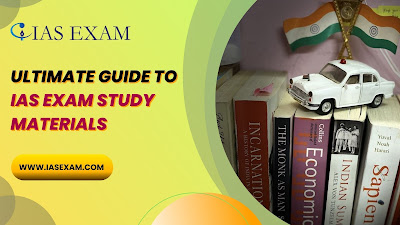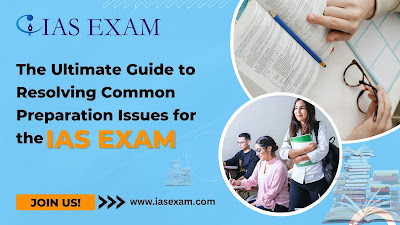Stepping into the hallowed grounds of IAS (Indian Administrative Service) preparation is akin to embarking on an odyssey where only the most resilient and astutely prepared warriors emerge victorious. Every year, thousands of aspirants throw their hats into the ring, dreaming of a coveted position within India's prestigious civil services. Yet, amidst this highly competitive arena, the right arsenal — in terms of study materials — can make all the difference between triumph and tribulation. This is where our Ultimate Guide to IAS Exam Study Materials by Iasexam.com becomes your indispensable ally.
Navigating through
the labyrinth of resources available for IAS preparation can often feel like
deciphering an ancient script. With myriad books, online platforms, and
coaching institutes vying for attention, pinpointing what genuinely aids your
quest can be daunting. But fear not! Our comprehensive guide meticulously
curates and demystifies the vast expanse of study materials, ensuring you are
armed with nothing but the best. From classic textbooks that form the bedrock
of preparation to cutting-edge digital tools that offer a competitive edge, our
guide is tailored to transform zealous aspirants into future administrators.
Understanding the IAS Exam
Diving into the
world of Indian Administrative Services (IAS) is akin to embarking on an
intellectual adventure that pledges unparalleled prestige and responsibility.
What sets the IAS exam apart isn't just its rigorous nature, but how it
meticulously surveys a candidate's aptitude across various domains, ensuring
only the most versatile and resilient minds lead the bureaucratic front. This
examination is a melting pot of subjects ranging from history to technology,
evaluating aspirants not merely on their memorization skills but their ability
to interlink concepts and apply them to solve real-world governance challenges.
One engaging
perspective often overshadowed in discussions about IAS exam preparation is
understanding its essence beyond books. It’s not solely the quality or quantity
of study materials that paves the way for success; rather, it's about
developing a discerning mind that questions, critiques, and innovates. As
future administrators, candidates are tested on their potential to be visionary
leaders who can drive societal transformations amidst adversities. Therefore,
align your study strategy not just with academic accomplishments but with
nurturing thought leadership and empathy towards societal needs - principles
that stand at the core of civil services.
The IAS exam, a
beacon for aspiring civil servants, demands not just hard work but smart
navigation through its complex landscape. At the heart of this journey lies an
understanding of its meticulously crafted pattern and syllabus, which stand as
gatekeepers to your dream career. The Union Public Service Commission (UPSC)
lays down a three-tiered structure—Preliminary, Mains, and Interview—each
designed to test different facets of a candidate’s aptitude. However, it’s not
just the breadth of knowledge that matters; the UPSC values depth and
perspective above all else.
Diving deeper into
the syllabus reveals a well-thought-out blend of static knowledge and dynamic
current affairs, reflecting the qualities expected in an IAS officer. But
here's where most candidates falter - mistaking quantity for quality. The
secret sauce? Integrate your preparation with interlinking concepts across
subjects and prioritizing analytical over rote learning. This approach not only
enhances retention but also prepares you for the unpredictable nature of essay
and case study questions in Mains. Remember, every topic in the vast syllabus
has potential intersections with real-world governance challenges; spotting
these connections is key to standing out in both written exams and interviews.
So as you dive into your study materials at Iasexam.com or elsewhere, keep this
holistic view in mind—it might just be what tips the scales in your favor.
Essential Books for Preliminary and Mains Examination
Navigating through
the ocean of books for IAS exam preparation can be an overwhelming task.
However, embracing a few quintessential books can significantly streamline this
journey. For the Preliminary Examination, Indian Polity by M. Laxmikanth stands
as an indispensable resource that not only illuminates the intricate workings
of the Indian political structure but also hones analytical skills required to
tackle prelims with finesse. Similarly, Environment by Shankar IAS is another
gem that meticulously covers environmental and ecological concepts pertinent to
current global and national scenarios, making it non-negotiable for aspirants
aiming for success in prelims.
When shifting gears
towards the Mains Examination, the spectrum of study materials broadens yet
becomes more focused. Here, Essays for Civil Services by Pulkit Khare becomes
an ally in mastering essay writing with its rich compilation of essays on
diverse topics relevant to India and the world at large. Complementing it is
“History of Modern India” by Bipan Chandra; a narrative so compellingly written
that it not only enhances one's understanding of modern Indian history but also
equips aspirants with critical viewpoints necessary to dissect complex
questions during mains. These selections are not just books; they are your
partners in decoding the essence of complex subjects and transforming your
preparation into a fruitful endeavor capable of yielding desired outcomes in
both Preliminary and Mains Examinations.
Online Resources and Websites for Comprehensive
Preparation
In the labyrinth of
online resources, discerning which websites and platforms serve as true allies
in your IAS exam preparation journey can be a Herculean task. Yet, a few
standouts have emerged as quintessential harbors for aspirants seeking not just
information, but knowledge that is both comprehensive and contemporaneous. For
instance, the government's own UPSC portal offers an unprecedented look into
the intricacies of exam patterns, previous years' question papers, and succinct
guidelines that illuminate the path forward. This direct source serves as a
foundational bedrock from which candidates can venture out to explore further.
Venturing into
specialized online forums such as iasexam.com introduces aspirants to a universe
where peer learning and expert mentorship coalesce to form a dynamic learning
environment. Here lies an opportunity to engage with high-quality mock tests,
up-to-date study materials tailored to current
affairs, and strategic preparation tips directly from successful
candidates themselves. In this digital age where information overload is
common, filtering through to these gems can dramatically elevate one’s
preparation strategy from mundane to exceptional.
Utilizing Mock Tests and Previous Year Papers
Diving deeply into
the realm of IAS preparation, aspirants often wonder about that 'secret
ingredient' that can pivot their study strategy towards sure-shot success.
Enter the undeniable powerhouses of preparation – Mock Tests and Previous Year
Papers. These are not just random tools but a mirror to your readiness,
reflecting both your strengths and areas craving improvement. Unlike any other
resource, they provide a reality check against the time-bound pressure of the
actual exam, enabling candidates to refine their time management skills, a
crucial determinant in the high-stakes IAS exam.
But here's where it
gets interesting: utilizing these resources as part of an iterative feedback
loop can fundamentally transform one's preparation journey. After each mock
test or previous year paper attempt, taking a moment to analyze mistakes and
learn from them can exponentially enhance your learning curve. This method
embodies the very essence of active learning—engaging with material at a deeper
level and personalizing strategies for content retention and application under
pressure. So rather than viewing them as mere assessment tools, embracing mock
tests and previous year papers as integral components of your study regimen
could well be the game-changer in elevating your IAS prep to a whole new level.
Time Management and Study Strategies for Success
Time management
isn't just about scheduling; it’s an art of balancing urgency and importance
tailored to your unique rhythm. Imagine studying for the IAS exam as preparing
a gourmet meal: you wouldn’t start cooking without having all ingredients
ready, right? Similarly, effective study starts with having your materials
organized and a clear plan in place. Embrace techniques like the Pomodoro
Technique, breaking down your study sessions into focused intervals followed by
short breaks. This not only boosts retention but also wards off burnout.
Remember, it's not the hours you pour in but the focus within those hours that
counts.
Venturing beyond
traditional time management, think of your mind as a fertile garden where
knowledge seeds need time to grow; hence cultivating curiosity becomes crucial.
Why limit yourself to conventional study strategies when interdisciplinary
learning can offer fresh insights? Dive into history podcasts while exercising
or explore documentaries related to IAS syllabus topics during leisure time.
Integrating subject matter into daily life enriches understanding and makes
preparation less monotonous and more engaging. The formula for success here is simple
yet profound: weave learning into the fabric of your day-to-day life, making
every moment count towards achieving that coveted title of ‘IAS officer’.
Conclusion: Crafting Your Personalized IAS Study
Plan
As you stand at the
threshold of crafting your personalized IAS study plan, remember, this journey
is uniquely yours. The artifacts of knowledge gathered from the vast ocean of
resources may seem identical for all, but how an aspirant weaves these into
their mental tapestry can make all the difference. Every topic, every book, and
each mock test should resonate not just with what the syllabus dictates but
also with your learning style and pace. It's like concocting a signature dish
where the basic ingredients are known to all, but it's the chef's personal
touch that defines its essence.
Embarking on this
preparatory odyssey requires more than just hard work; it calls for strategic
hard work. Keep in mind that what works splendidly for one might not be as
effective for another. This customized plan isn't merely a schedule; it’s a testament
to understanding your strengths and areas needing improvement, aligning them
with exam requirements while making space for revisions and self-care routines.
Remember, cracking the IAS isn’t about memorizing information—it’s about
transforming information into knowledge and insights in ways that are most
productive for you. So let your study plan be a living document that grows and
adapts with you on this endeavor towards excellence.








.jpg)




